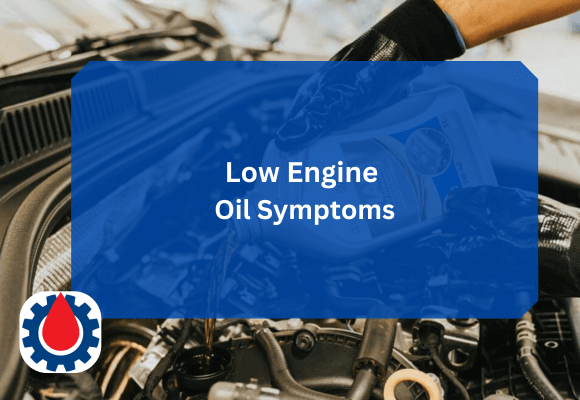When oil levels drop too low, your engine can suffer serious damage, leading to costly repairs or even complete engine failure. Recognizing the symptoms of low engine oil early can save you from these headaches.
In this post, we’ll explore the key signs of low engine oil, why they occur, and what you should do if you notice them.
Low Engine Oil Symptoms
1. Dashboard Warning Light
One of the earliest and most obvious indicators of low engine oil is the oil pressure warning light on your dashboard. This light, often shaped like an oil can or labeled “OIL,” illuminates when the oil pressure drops below a safe level. Low oil levels or a failing oil pump can trigger this warning.
If you see this light, check your oil level immediately using the dipstick and top it off if needed. Persistent illumination after adding oil could indicate a leak or other issue requiring professional attention.
2. Unusual Engine Noises
Engine oil reduces friction between moving parts. When oil levels are low, metal components can grind against each other, producing unusual noises like knocking, ticking, or grinding. These sounds often become more pronounced during acceleration or at high RPMs.
If you hear such noises, it’s a sign that your engine is under stress due to insufficient lubrication. Continuing to drive in this condition can cause severe damage, so check your oil and address the issue promptly.
Related Is Low Engine Oil Bad(Dangers of Low Engine Oil)
3. Overheating Engine
Oil absorbs and dissipates heat generated by the engine. Low oil levels reduce the engine’s ability to manage heat, leading to overheating. You might notice your temperature gauge creeping into the red zone or steam rising from the hood. Overheating can warp engine components or cause the head gasket to fail, leading to expensive repairs.
If your engine is running hotter than usual, low oil could be the culprit. Pull over safely, let the engine cool, and check the oil level.
4. Burning Oil Smell
A distinct burning oil smell inside or around your vehicle is another red flag. Low oil levels can cause the remaining oil to overheat, producing a burnt odor. This smell may also indicate an oil leak, where oil drips onto hot engine components and burns off.
If you notice this smell, inspect your vehicle for visible leaks and check the oil level. Addressing leaks early can prevent further oil loss and potential fire hazards.
Related Low Engine Oil Pressure(8 Common Causes & Solutions)
5. Poor Engine Performance
Low engine oil can lead to sluggish performance, including reduced acceleration, difficulty maintaining speed, or a general lack of power. This happens because the engine isn’t properly lubricated, causing increased friction and reduced efficiency.
You might also notice your vehicle struggling to climb hills or respond quickly. If your car feels underpowered, check the oil level and consider other factors like dirty oil or a clogged filter.
6. Increased Fuel Consumption
When your engine lacks proper lubrication, it has to work harder to perform, leading to higher fuel consumption. If you’re visiting the gas station more frequently without a clear reason, low engine oil could be to blame. Monitor your fuel economy and check your oil level if you notice a sudden drop in efficiency.
7. Dark, Dirty Oil
While checking your oil, pay attention to its color and consistency. Clean engine oil is typically amber or light brown. If the oil on your dipstick appears dark, gritty, or sludgy, it may be old or contaminated, reducing its effectiveness. Low oil levels combined with poor oil quality exacerbate engine wear. If the oil looks dirty, it’s time for an oil change, even if the level is technically sufficient.
Related Engine Tick After Oil Change(5 Causes + Solutions)
8. Exhaust Smoke
Blue or gray smoke coming from your exhaust is a serious symptom of low or burning oil. This can occur if oil leaks into the combustion chamber due to worn seals or low oil levels. Unlike white steam (which indicates coolant issues), blue smoke is a clear sign of oil burning. This requires immediate attention from a mechanic to diagnose and fix the underlying issue.
What to Do If You Notice These Symptoms
If you observe any of these symptoms, take action immediately to prevent further damage:
1. Check the Oil Level: Park on a level surface, let the engine cool, and use the dipstick to check the oil level. If it’s below the “low” mark, add the recommended oil type for your vehicle.
2. Inspect for Leaks: Look under your car for oil spots or puddles. Common leak points include the oil pan, gaskets, or seals.
3. Top Off or Change the Oil: If the oil is low but clean, top it off. If it’s dirty or past due for a change, schedule an oil change.
4. Visit a Mechanic: Persistent symptoms like warning lights, noises, or smoke require professional diagnosis. A mechanic can check for leaks, worn components, or other issues.
5. Follow Maintenance Schedules: Regular oil changes (typically every 3,000–7,500 miles, depending on your vehicle) and routine inspections can prevent low oil issues.
Related Engine Overheating After Oil Change(6 Causes + Solutions)
Preventing Low Engine Oil Problems
Prevention is always better than repair. Here are some tips to keep your engine oil at optimal levels:
- Regular Checks: Check your oil level monthly or before long trips.
- Use Quality Oil: Always use the manufacturer-recommended oil type and viscosity.
- Stick to Maintenance Schedules: Follow your vehicle’s oil change intervals.
- Address Leaks Promptly: Fix any oil leaks as soon as they’re detected.
- Monitor Driving Habits: Aggressive driving or frequent short trips can increase oil consumption.
Related Engine Oil Temperature Chart(Complete Guide)
Final words
Low engine oil can lead to serious consequences, but catching the symptoms early can save your engine and your wallet. From dashboard warnings to unusual noises and poor performance, these signs are your vehicle’s way of crying for help.
By staying vigilant, checking your oil regularly, and addressing issues promptly, you can keep your engine running smoothly for years to come.




